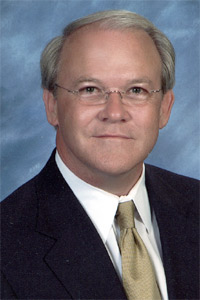Frank Page, pastor of First Baptist Church, Taylors, was elected president of the Southern Baptist Convention at the Annual Meeting of the Southern Baptist Convention in the Greensboro (N.C.) Coliseum June 13.
 Frank Page
Frank PagePage received 4,546 votes of the 9,005 ballots cast, or 50.48 percent, in a race against Jerry Sutton of Nashville, Tenn., who received 2,168 votes, or 24.08 percent, and Ronnie Floyd of Springdale, Ark., who received 2,247 votes, or 24.95 percent. At the time of the election on Tuesday afternoon, there were 11,346 registered messengers.
In nominating Page, Forrest Pollock, pastor of Bell Shoals Baptist Church, Brandon, Fla., urged the messengers to elect a president who “leads by example.”
“What do you say to that rural pastor, or the bi-vocational man who hasn’t had a raise in years, because his church is so committed to CP giving? – What do you say to the WMU president or that great saint who writes a check every Christmas to the Lottie Moon Offering? – What do you say to that child who drops his allowance money into a vacation Bible school bucket?” Pollock asked.
“You need to say, ‘We’ve got a president who leads by example,'” Pollock answered.
Declaring that Southern Baptists “have to work together if we are going to accomplish the Great Commission,” Pollock asserted, “In your heart, you know and I know, the Cooperative Program is in trouble. Our convention is in trouble.
“We need a very special kind of leader who will stand up and not only love the word of God, the inerrant Bible, but who also will support the Cooperative Program,” Pollock said.
Pollock highlighted that Taylors First Baptist Church gives 12.4 percent of its undesignated receipts to the CP, the “traditional means of supporting our missionaries,” and he underscored that Page is “a soul winner who has led his church to start a new mission every year.”
Assuring that Page would nominate only biblical inerrantists to positions of leadership, Pollock maintained, “the issue is not about theology; it’s about methodology.”
 Forrest Pollock
Forrest Pollock“If you are going to be the champion for the Cooperative Program, you have got to give to it,” Pollock maintained. “My grandfather didn’t have a seminary degree, but even he understood you can’t even spell ‘SBC president’ without a ‘C’ and a ‘P,'” he quipped.
Page is thought to have drawn support from a movement of younger conservatives who felt they should have greater influence in the development of denominational emphases and policies. He also is believed to have garnered support among those who say the leadership of the convention is too closely controlled.
In a radio interview on the eve of the convention, the Taylors pastor said he wants to involve more people in leadership. “I am tired of seeing the same names,” he said. He said he wants to see people elected to SBC positions who have a “sweet spirit,” evangelistic zeal, and who will affirm the inerrancy of the Bible.
Page said his presidency would not change the theological direction of the convention, but “broaden the tent numerically.” Page said he is a conservative of record, a strong supporter of the Baptist Faith and Message 2000 and the author of numerous conservative writings.
Page said that as president he would encourage churches to think about “missions and how we do missions.”
“I see this whole election as a referendum on the future,” Page said.
Other officers elected
In the election for first vice president, in a runoff, Jimmy Jackson, a pastor from Huntsville, Ala., received 51.44 percent or 1,107, of the votes, edging Mark Dever, a pastor from Washington, D.C., who received 47.86 percent, or 1,030 votes.
On the first ballot, Dever received the most votes, with 29.72 percent, or 1,090 votes, and Jackson received 27.48 percent, or 1,008 votes. Meanwhile, Kelly Burris, a Virginia Beach, Va., pastor, received 22.76 percent, or 835 votes, and Keith Fordham, an evangelist from Fayetteville, Ga., received 19.79 percent, or 726 votes.
In the election for second vice president, Wiley Drake, a pastor from Buena Park, Calif., received 50.37 percent of the vote, or 2,408 votes, on the first ballot over three other nominees.
